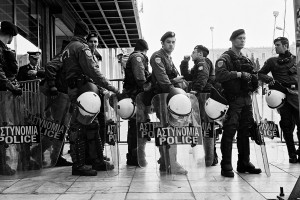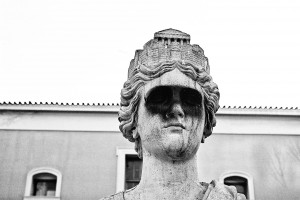On pages 94-105 we featured a photo-story shot in Greece by Celeste Solman, with a witty essay on Europe by Pepe Zanker. This is the translation of his article:
Oh Europe
The end draws near. The downfall of the euro, the collapse of the EU, the entire global economy and probably also the end of Western civilisation are imminent. And have been for so long that “imminent” is barely the right word. As enthusiastic about end time scenarios as ever, the magazine Spiegel presented the inevitable downfall during the last year with melting, cracking or shattering euro coins on no less than six of its covers. For the second time, the magazine used Photoshop to ruin the already ruinous Acropolis, thereby underscoring the destruction of civilisation.
If no line is drawn between the current national debt crisis and the credit crunch four years ago (after all, the countries that are now bankrupt where once those who saved the crashing banks), we might say we’ve been waiting since then for the meltdown of the global finance system or, at least for a few years, for the end of the European Union in its current form.
But while we are still waiting for the disaster and repeated speculations about the collapse of Greece have gained – due to the familiarity of the idea – an increasingly soothing character, only one thing seems absolutely sure: it is highly uncertain what will happen at any point in the future.
It’s no novelty that people find uncertainty and its undesirable consequences quite unpleasant. It has us parading the holes in our socks when going through airport security, convinced women they must marry boring men and these men to sign building-saving contracts. To be fair, it should be noted that our need for security has also bred more entertaining spin-offs: Chinese emperors built over-the-top walls visible from the moon, burgraves filled their moats with crocodiles and other interesting creatures, and we invented high-visibility jackets that can now be worn at techno raves.
Ultimately, the need for security probably underlies the current policy of under no circumstances cutting off funding for Greece – even if for the umpteenth time the country has spent all its pocket money on champagne and drugs by the beginning of the month. Instead we are told that the bold attempt should be made to educate Alexis Sorbas from Crete in the ways of Hans Häberele from Göppingen. Of course, no one can guess what the capricious illuminati at S&P and Moody’s ultimately think of this idea. Hence it is very likely that uncertainties will further define our EU experience and broken euro coins the covers of Spiegel.
Unfortunately, the need for security in the European metropolis of Brussels has a very real and disconcerting impact on the people on Europe’s southern periphery. Spanish, Portuguese, and all Greeks who haven’t registered their shipping companies on the Cayman Islands, are currently experiencing a period of great uncertainty. In Greece, almost every second young person faces unemployment, with no end in sight. The shock may be even greater for older people, who are – after a life of well-kept middle-class happiness – suddenly threatened with living at a subsistence level or are being evicted from their homes.
This is not just a tragedy for the Greeks, but also affects anyone who does everything in everyday life to safeguard themselves from future strokes of fate. It means that no building-saving contract, no civil service job and no protective sofa covers can prevent blows of fate or drunken guests with red wine bottles.
Various reactions to the cruel imponderability of the future are possible: one can flee to a solar-powered houseboat with a lifetime’s supply of propane gas canisters, like Dimitry Orlov, fan of autarky and author of recession-resistant doomsday literature. But perhaps it might be better to stick with people like Nassim Nicholas Taleb, self-taught philosopher and hobby scholar, who has made a fortune with his “philosophy of randomness” (the belief in the unpredictability of the future and thus also of markets), and is now celebrated as a prophet of randomness and, in contrast to Orlov, certainly doesn’t ride a bike.
We can, however, also simply try to face the fact that things will always happen that we cannot control and instead focus on the more pleasant aspects of these events: after all, Napoleon’s ugly wars of aggression led to the spread of the Enlightenment in Europe; a hopelessly disastrous Indian expedition to the discovery of America; and grapes that had inadvertently gone off to alcohol. And today’s euro crisis, with mass migration from southern Europe to Germany, might be the first step towards a stronger European identity – if enough job-seekers from Thessaloniki and Wedding come together at Berlin’s bars and for want of anything else set up delivery services, removal firms and cigarette smuggling rings.
If all this doesn’t provide consolation, it’s worth taking a look at the overall standings in the “humanity vs. downfall” contest. A bit like Julian Simon, the “doom-slaying” economist who, tired of hearing that it won’t be long before everything goes to the dogs as a result of overpopulation and resource scarcity, made the effort to look at the facts: according to him, in every critical area humanity is better off now than it was 20 years ago, to say nothing of 100 years ago. Contrary to all expectations, most resource prices have fallen, global hunger has not been wiped out, but apparently significantly reduced, the ozone hole has shrunk and denim jackets are out. Simon would have definitely also had something to counter the global warming debate if he hadn’t died 13 years ago.
When he was still alive, he categorically reinforced his optimistic theories by making long-term bets on economic developments with his pessimistic colleagues. He bet against the negative scenario – and won every time.
Author: Pepe Zakner
Photos: Celeste Melisande Sloman
Order your copy of issue 4 at mag@horstundedeltraut.com!






